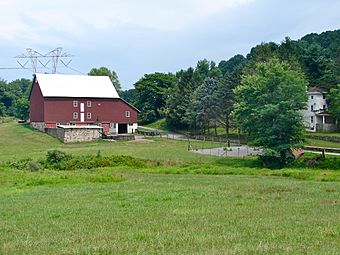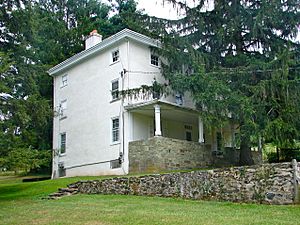Kuerner Farm facts for kids
|
Kuerner Farm
|
|
 |
|
| Location | 415 Ring Road Chadds Ford, Pennsylvania |
|---|---|
| Area | 33 acres (13 ha) |
| Built | c. 1814 |
| Architect | Caleb Ring |
| Architectural style | Colonial |
| NRHP reference No. | 11000564 (original) 14000924 (increase) |
Quick facts for kids Significant dates |
|
| Added to NRHP | June 23, 2011 |
| Boundary increase | August 25, 2014 |
| Designated NHL | June 23, 2011 |
Kuerner Farm, also known as Ring Farm, is a very old farm in Chadds Ford, Pennsylvania. It's famous because the artist Andrew Wyeth spent many years painting here. He created about one-third of all his artworks—over 1,000 paintings and drawings—inspired by the farm and its surroundings.
The farm is so important that it was added to the National Register of Historic Places and named a National Historic Landmark in 2011. This means it's a special place in American history. Kuerner Farm is right next to the Brandywine Battlefield, which is another important historical site. Today, you can visit the farm on public tours given by the Brandywine River Museum.
Contents
Farm History and Wyeth's Connection
Early Days of Kuerner Farm
The Kuerner Farm has a long history. The Battle of Brandywine was fought nearby on September 11, 1777. Even today, you can find old cannonballs and small metal pieces from that battle in the farm's fields. While soldiers marched past on Ring Road, no actual fighting happened right on the farm property. The Brandywine Battlefield State Park is only about half a mile north of the farm.
The main farmhouse was built around 1814 by Caleb Ring. Later, around 1850, a third floor was added to the house.
The Wyeth Family and the Farm
Famous illustrator Howard Pyle taught art students, including Andrew Wyeth's father, N. C. Wyeth. Pyle taught them at Turner's Mill, which was just north of the farm, from 1898 to 1903. This shows the artistic connection to the area even before Andrew Wyeth.
In 1926, Karl Kuerner and his wife Anna started renting the farm. They bought it in 1940. Karl was originally from Germany, where he had been a sheepherder. Andrew Wyeth painted his first picture of the farm in 1932, when he was just 15 years old.
A sad event happened in 1945. Andrew's father, N. C. Wyeth, and his grandson died in a car accident near the farm. Their car was hit by a train at a railroad crossing.
Helga Testorf and Secret Paintings
In 1971, Andrew Wyeth met Helga Testorf at the farm. She was a nurse taking care of Karl Kuerner. Helga lived across the road from the farm. Soon, she began to secretly pose for Wyeth. He created a famous series of paintings and drawings of her, known as The Helga Pictures. The first painting in this series was made in the sewing room of the farmhouse that same year.
There are more than 240 artworks in this series. They were kept secret until 1987, when they were shown to the public at the National Gallery of Art.
The Farm Today
Karl Kuerner passed away in 1979, and Anna died in 1997. In 1999, the Brandywine Conservancy bought the farm. Today, the Brandywine River Museum offers tours of the farm.
Kuerner Farm was officially named a National Historic Landmark and listed on the National Register of Historic Places in 2011. In 2014, the listing was expanded to include an old schoolhouse nearby that Andrew Wyeth used as his art studio.
Famous Artworks Created at Kuerner Farm
Many of Andrew Wyeth's most famous paintings were inspired by Kuerner Farm. He captured the farm's buildings, landscapes, and the people who lived there.
Some of the well-known paintings Andrew Wyeth created here include:
- Winter 1946 (1946)
- Snow Flurries (1953)
- Brown Swiss (1957)
- Groundhog Day (1959)
- Evening at Kuerners (1970)
- Young Bull (1960)
- Spring Fed (1967)
- Overflow (1978)
- Snow Hill (1989)
- Karl
- The Kuerners
It was also at Kuerner Farm that Wyeth created many of The Helga Pictures. This series of more than 200 artworks all feature Helga Testorf as the model. Wyeth met her when she was caring for Karl Kuerner, the farm's owner.
 | Isaac Myers |
 | D. Hamilton Jackson |
 | A. Philip Randolph |




